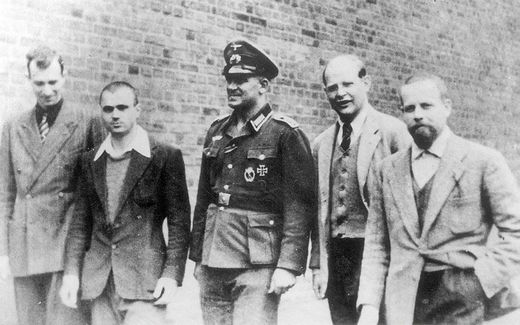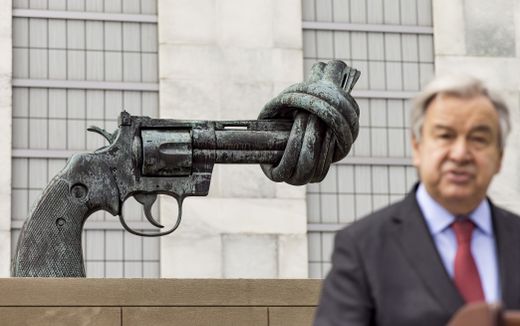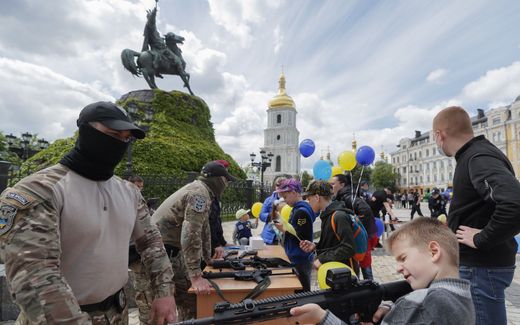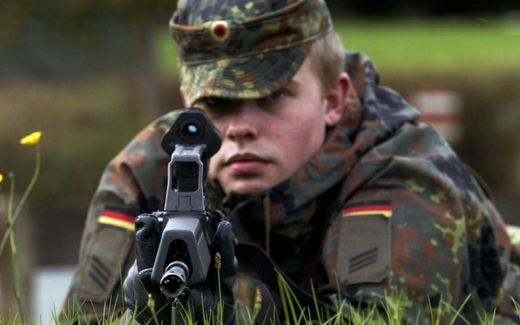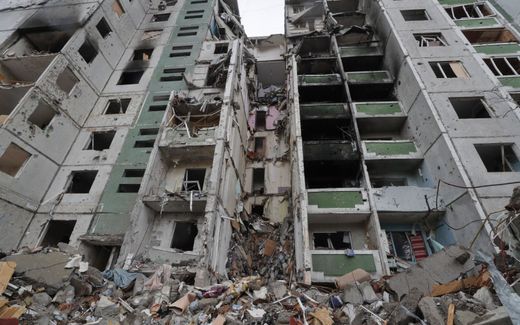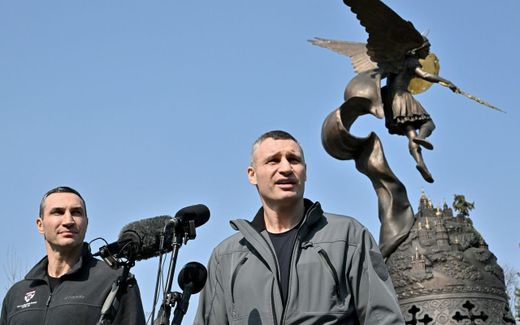Fear not! – in the face of the military invasion of Ukraine
10-05-2022
Opinion
Prof. Fernando Enns

Military weapons in civilian clothing. Photo EPA, Salvatore di Nolfi
Opinion
Non-violence is a good ideal. Maybe even a Christian ideal. But is it possible to maintain during a war? Prof. Fernando Enns from the German Mennonite Community argues how this could bind Christians together.
"Then Jesus said to them: Fear not! Go and tell my brothers [and sisters], that they may go into Galilee: There shall they see me." (Matthew 28,10)
I heard these words of Jesus, first spoken by "the Risen One" to "Mary of Magdala and the other Mary" on Easter morning 2022 – in the context of the terrible and senseless killing and destruction in Ukraine. This war of aggression is unjustifiable. And those who are responsible for it will have to give account for it.
But what can we do –so far "only" indirectly affected, but still brothers and sisters in the worldwide ecumenical movement– for the people in Ukraine and Russia?
Seek orientation: the "highest commandment" – extended!
Whenever the question "What shall we do?" arises in situations of need, the highest commandment comes to mind. Jesus' answer is to love God and neighbour, quoting the Hebrew Bible (Mark 12,30f.).
And in the Sermon on the Mount, He concretises this by, among other things, the prohibition of killing and expands it by the commandment to love your enemies, "... and pray for those who persecute you" (Matthew 5,44).
Should we now prioritise other plausibilities, such as wanting to secure peace by relying on economic dependencies? Should "the Crucified One" have meant that His commandments apply exclusively to peaceful times? No, these commandments must prove themselves precisely in times of threat, disorientation and propaganda, fear and despair. But their credibility depends on those who believe this gospel – and act on it. "Fear not!" is the very real encouragement.
Take responsibility: for the neighbour – and the enemy!
The commands of "the Risen One" do not allow for passive leaning back or staying out of the way. These commands are empowerments. "Go and proclaim it to my brothers [and sisters]". Jesus calls for responsibility for each and every neighbour. The church has a clear mandate to "unite those under the wheel", Dietrich Bonhoeffer declared (in 1933, in view of the enactment of the Aryan Paragraph).

This takes such diverse forms as we see now: not only willingly taking in fleeing people but also picking them up; selflessly providing and taking urgently needed relief supplies; providing medical care; offering initial pastoral care to traumatised people; prayers and vigils are also part of this.
However, if a government no longer fulfils its very own duties, then these commandments (according to Bonhoeffer) can also mean "falling into the spokes of the wheel". How can a war, this seemingly independent military killing machine, be stopped so that more do not "fall under its wheels"?
Legal remedies against nation-state action are available through international law (if they apply equally to all), economic sanctions are called for (though they only really take effect when we ourselves are prepared to "pay" for them), civil disobedience can be supported; granting asylum to conscientious objectors and showing soldiers who are willing to desert the possibility of leaving the military; strengthening non-violent resistance and civil defence; an honest and self-critical explanation of the genesis of a conflict as well as the provision of reliable, independent information can also be included in this.
In all the search for concrete answers, those concretisations of the Sermon on the Mount that demand responsibility for enemies' lives must not be naively pushed aside. The temptation is great to fall into instinctive behaviour patterns and superficial "quick fixes" by resorting to violence ourselves.
It seems somewhat more "justifiable" to supply weapons to those who think they can protect themselves with them (and it looks even more "harmless" to give them money so that they can buy weapons). However, we do not fall into the wheel's spokes but instead, continue to drive it forward. Of course, by supplying weapons, the "victims" can also "turn the wheel". But in the end, we all end up on the slippery slope from which there will soon be no way out, and reconciliation will be a very long way off. Killing and suffering continue to increase, and the wisdom of the gospel itself ends up being thrown under the wheels.
To emphasise it clearly: The guiding motive for action cannot be a concern for one's innocence or moral superiority. For this is what Christ died for, that we give up all our attempts at justification and let ourselves be freed by his forgiveness of guilt to take responsibility actively. But we abuse this central "love of God for our enemies" as a "cheap grace" if we think we are allowed to become masters of death and life ourselves.
Choose perspective: "Go to Galilee".
The "Risen One" tells the women that the disciples should "go to Galilee" because: "There they will see Me. The decisive factor is the perspective chosen, the choice of one's own place from which peace and justice are sought. The political centre of power ("empire") is in Rome, the religious in Jerusalem. Galilee, on the other hand, is also called the "territory of the Gentiles" (cf. Is. 8:23).
Galilee lies "on the edge". It has always been culturally and religiously heterogeneous, correspondingly politically turbulent. Differences between a wealthy upper class in the cities and an impoverished rural population led to a strong longing for socio-economic change.
Jesus does not "locate" Himself in the centres of power but promises His presence at the margins of power. And He invites His followers to seek Him out there.
In the wars of our day, this means for the Church of Jesus Christ to undertake all reflection and action from this perspective at the "margins". The church does not have to devise a wiser (power) policy and should not first concentrate on the warring governments when looking for their own action options. It must be where the suffering is palpable, where the need is real, where people are dying – and killing. It should not preach a gospel of national interests, never ingratiate itself with the power elites as a compliant partner. Jesus will not be found there.

Only from the poor and the persecuted perspective will the church expose their hubris will some self-perception as "the good guys" be confronted with simplistic stereotyping of the "others" as constructed enemy images. The Church of Jesus Christ can only fulfil the prophetic task of "speaking truth to power", also towards its own political, economic and religious centres, if it does not allow itself to be taken over by them or gives up the attitude that it can itself be part of these elites.
Did "the Risen One" tell all this to women first because he hoped that they would understand it sooner than men?
Live ecumenism: Demanding accountability from one another
The member churches of the World Council of Churches (which includes the Russian Orthodox Church as well as many Christians in Ukraine, the German Protestant EKD church as well as my own Mennonite Church in Germany (AMG)) adopted a joint "Declaration on the Way of Just Peace" by consensus during the last Assembly in Busan in 2013. Together we confess:
Despite persecution and suffering, Jesus remains steadfast in his humility and active non-violence, even unto death... With Jesus' resurrection, God affirms that such steadfast love, obedience, such trust lead to life. By the grace of God, we too can walk the way of the cross, be disciples, and pay the price."
If a church (or its leadership) now thinks it can justify or endorse violence (here even against brothers and sisters in faith) for political and nationalistic reasons, or another church says it can legitimise arms deliveries against this "enemy" to protect some against others; then it is vehemently questioning this unity of the churches (as, for example, the German Christians at the beginning of World War II or the "white churches" at the time of apartheid in South Africa). We will have to demand accountability from each other if we do not want to turn Jesus' prayer in John 17 into a "cheap unity".
There are no easy answers in the face of hatred and the wanton destruction of human life and nature by war. And frivolous reactions are forbidden. This is precisely why it is crucial to seek guidance from "the Risen One" and act accordingly. Even if this seems "unworldly" to those, who cannot or do not want to see this world in the light of Christ's reality. "Fear not!"
Prof. Fernando Enns is lecturing Peace-theology at the Free University in Amsterdam, the Netherlands. He is also connected to the Centre for Peace Church Theology in Hamburg, Germany.
Related Articles

